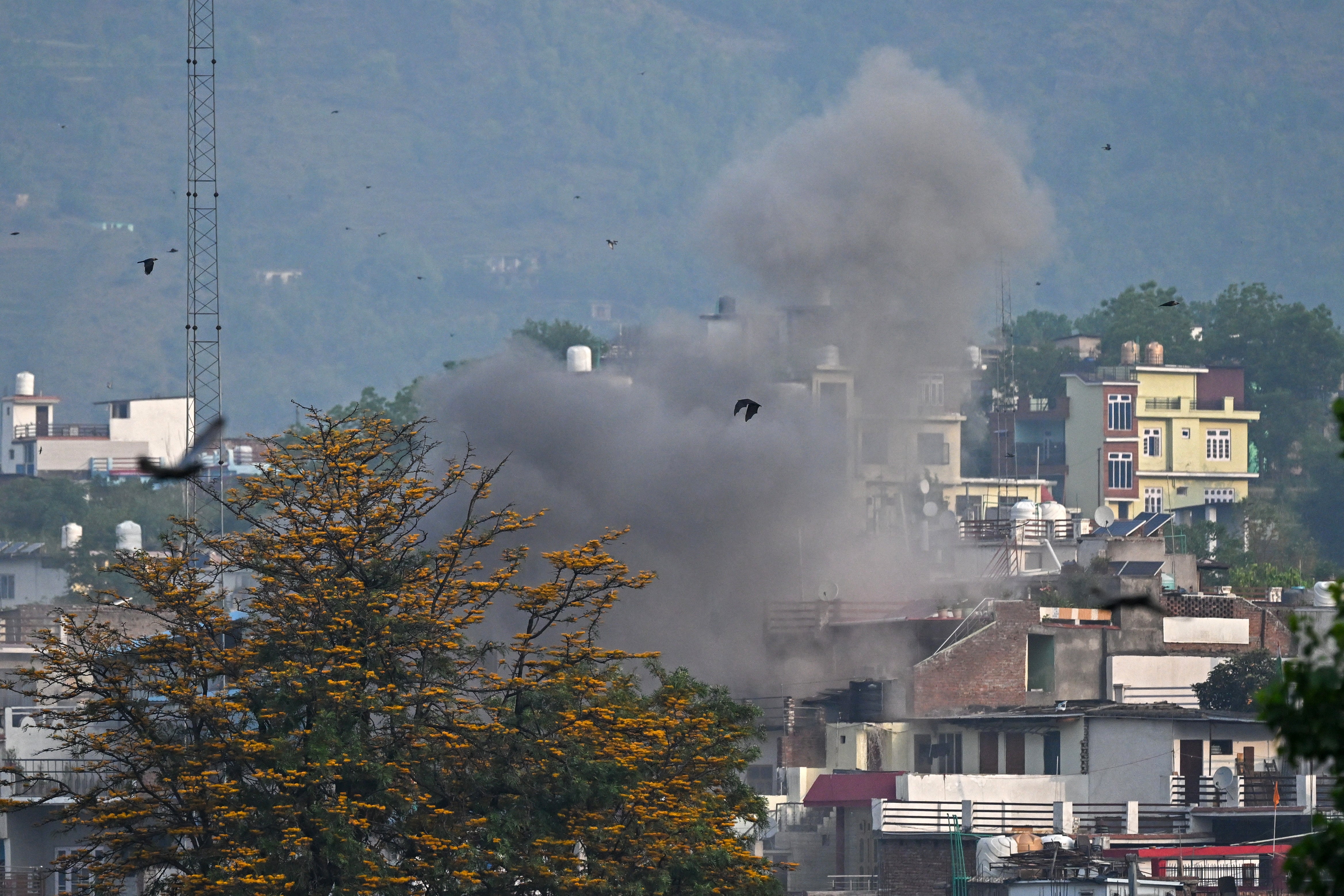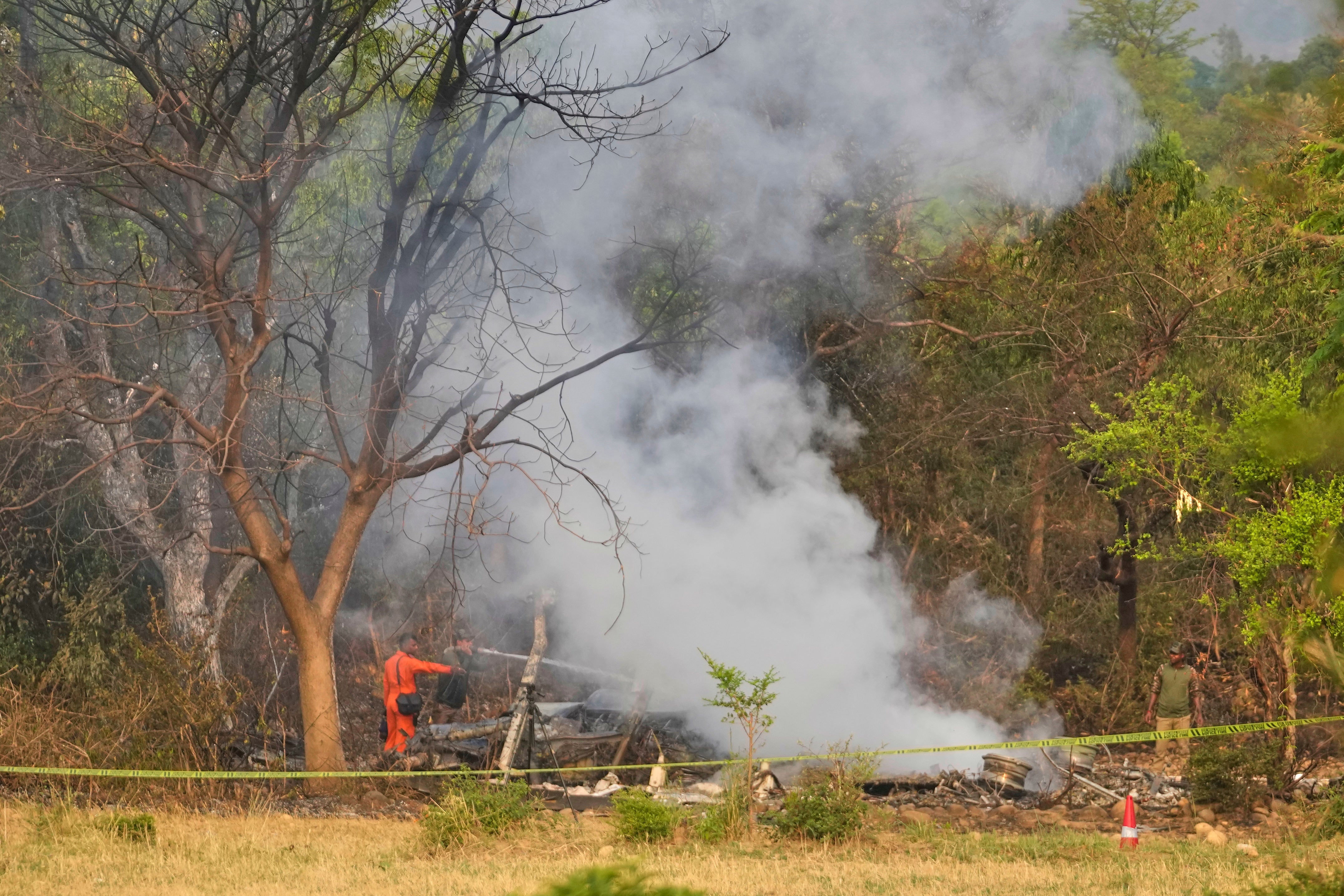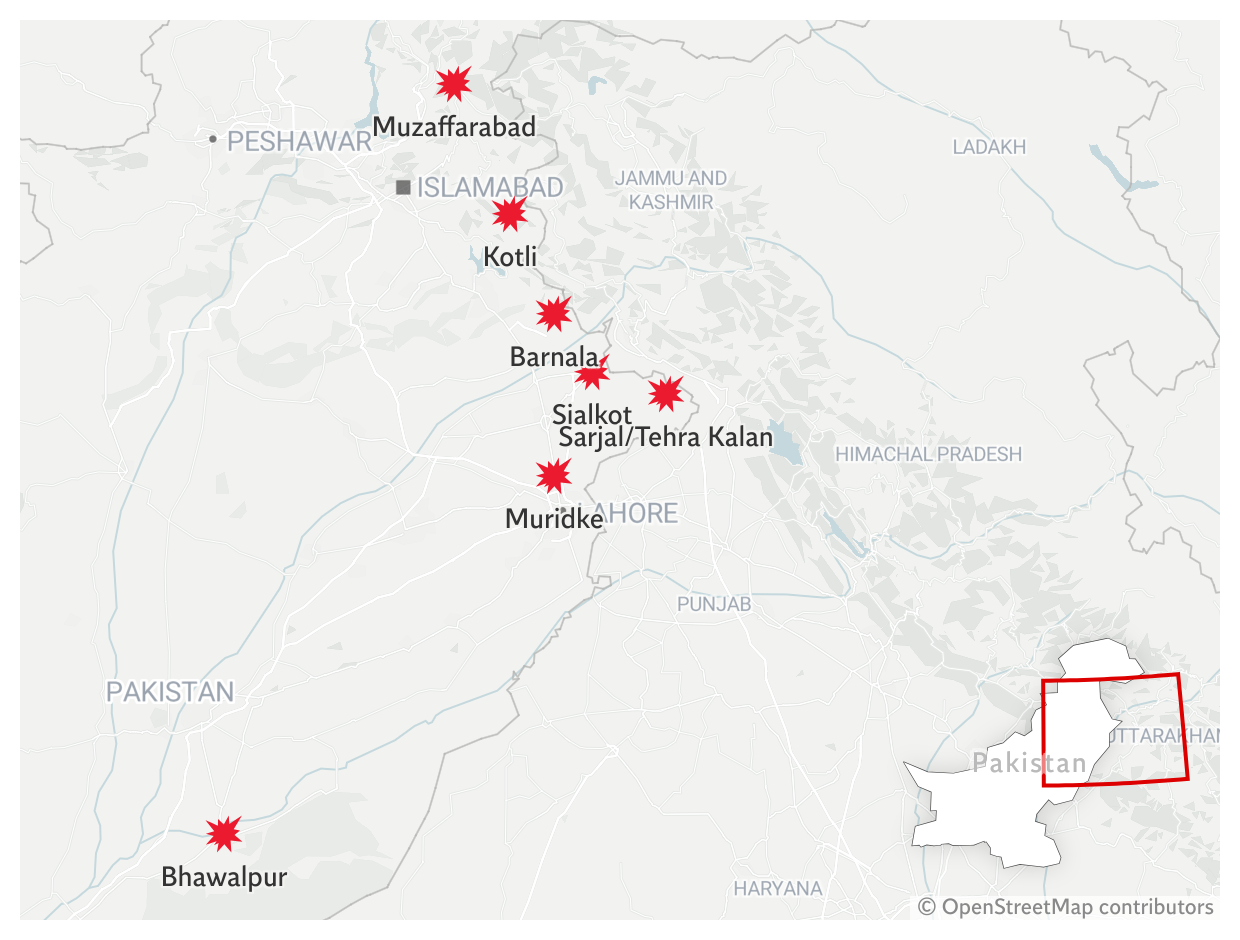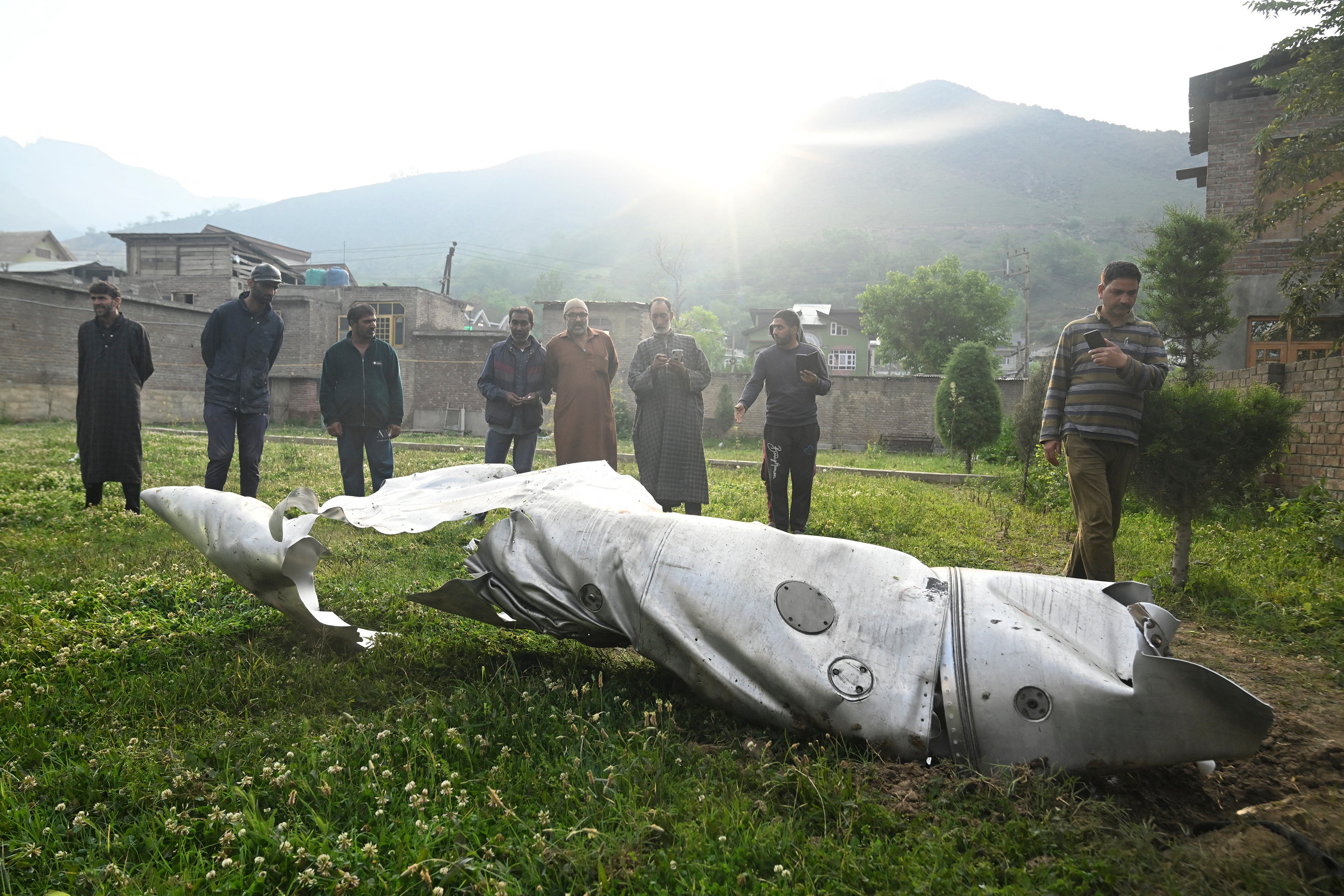India fired missiles across the border into Pakistan and Pakistan-administered regions early on Wednesday in response to the deadly terror attack in Kashmir’s Pahalgam which claimed 26 lives last month.
The attack, which took place at the popular tourist destination on 22 April during peak tourist season, was the deadliest on civilians in Kashmir in decades. According to witnesses, the attack in Pahalgam was carried out by four to six gunmen in military fatigues who emerged from a nearby forest and unleashed a barrage of gunfire from close range.
The missiles, fired in the early hours of Wednesday from India’s airspace near Kashmir, hit multiple areas in Pakistan that India believes to be terror hideouts and infrastructure, Indian defence ministry officials said in a statement.
The strikes were carried out between 1.05am to 1.30am, they said.
“A little while ago, the Indian Armed Forces launched ‘Operation Sindoor’, hitting terrorist infrastructure in Pakistan and Pakistan-occupied Jammu and Kashmir from where terrorist attacks against India have been planned and directed,” the Indian defence ministry said, adding that the Indian Army targeted a total of nine sites
Follow the latest coverage of India’s airstrikes on Pakistan here
India’s ministry of external affairs on Wednesday held a press briefing in capital Delhi to share information about the alleged terror camps targeted and show aerial footage of the airstrikes.
"The selection of these targets for Operation Sindoor was based on credible intelligence inputs and the role of these facilities in perpetrating the terror activities. The locations were also selective to avoid damage to civilian infrastructures and loss of any civilian lives. This was done with due diligence, and the camps selected for targeting and their engagement will now be shown to you,” said Indian Air Force’s wing commander Vyomika Singh present at the briefing.
She added that India’s cross-border strike operation was “undertaken through precision capability”.

“A niche technology of weapons with careful selection of warheads was ensured so that there will be no collateral damage. The point of impact in each of the targets was a specific building or a group of buildings,” the Indian Air Force official said.
She added that all targets aimed at by India were “neutralised with clinical efficiency, and the results reiterate the professionalism of the Indian armed forces in the planning and execution of their operations”.
“India has demonstrated considerable restraint in its response. However, it must be said that the Indian Armed Forces are fully prepared to respond to Pakistani misadventures, if any, that will escalate the situation,” Commander Singh said.
The nine locations shared by India include Muzaffarabad, Kotli, Rawalakot, Chakswari, Bhimber, Neelum Valley, Jhelum, and Chakwal in Pakistan-occupied region and Bahawalpur inside Pakistan.
Pakistan's prime minister Shehbaz Sharif has called the pre-dawn strikes by India on Pakistani soil an "act of war" and said Islamabad reserves the right to "give a strong response". A day after the Pahalgam attack, when India and Pakistan fired diplomats on each side, Pakistan’s foreign minister Ishaq Dar called Delhi’s punitive measures “immature” and “hasty”.
“India has not given any evidence. They have not shown any maturity in their response,” Mr Dar told a TV channel. “This is a non-serious approach. They started creating hype immediately after the incident.”
Both sides claimed casualties in the cross-border strikes. Pakistan’s Army chief Syed Asim Munir said the strikes killed 26 civilians and injured 46 others. Pakistan’s prime minister Shahbaz Sharif has called Indian airstrikes an act of war.

The Indian Army attacked the terror infrastructures in Pakistan and Pakistan-administered territories that were being used to plan and direct attacks against India, the defence ministry said, adding that Pakistan’s military infrastructure was not targeted.
“Our actions have been focused, measured and non-escalatory in nature. No Pakistani military facilities have been targeted. India has demonstrated considerable restraint in selection of targets and method of execution,” the statement said.
“These steps come in the wake of the barbaric Pahalgam terrorist attack in which 25 Indians and one Nepali citizen were murdered. We are living up to the commitment that those responsible for this attack will be held accountable.”
“India has credible leads, technical inputs, testimony of the survivors, and other evidence pointing towards the clear involvement of Pakistan-based terrorists in this attack,” India’s embassy in Washington said in a statement shortly after the airstrikes.
India’s foreign secretary Vikram Misri said India’s intelligence of Pakistan-based terror modules showed “further attacks against India were impending”.

“There was thus a compulsion both to deter and to preempt. Earlier this morning, as you would be aware, India exercised its right to respond and preempt as well as deter more such cross-border attacks,” he said.
The Indian airstrikes “focused on dismantling the terrorist infrastructure and disabling terrorists likely to be sent across to India”, Mr Misri said.

A military retaliation from India against Pakistan was expected for days after the terrorist attack on civilians in Kashmir’s Pahalgam killed mostly tourists visiting the popular destination in April.
Sources involved in the investigation by the Indian security forces told NDTV and The Indian Express that the attack was likely carried out by at least five militants – three Pakistanis and two Kashmiris. The police identified the suspects as Adil Hussain Thoker from Anantnag in Kashmir, and Hashim Musa alias Suleiman and Ali Bhai alias Talha Bhai from Pakistan.
The police claimed the suspects operated for the Lashkar-e-Taiba, a proscribed militant group based in Pakistan which promptly denied involvement. India has not made any arrests in the terrorist attack so far.
Last week, India’s prime minister Narendra Modi vowed that the country was “committed” to take “firm and decisive action” against “terrorists who carried out the Pahalgam attack and their supporters”.
Shortly after the official statement from the defence ministry, Indian Army’s official handle on social media shared a post reading: “Justice is Served. Jai Hind”, along with the Pahalgam Terror Attack hashtag.
Mr Misri said India had flagged its concerns about the terrorist group The Resistance Front (TRF), which briefly claimed responsibility for the attack but withdrew the statement later.

Pakistan-based terrorist organisations Lashkar-e-Taiba and Jaish-e-Mohammed, which have previously carried out several deadly terrorist attacks on India, were operating through the TRF group, he said during the press briefing.
“Investigations into the Pahalgam terror attack have brought out the communication notes of terrorists in and to Pakistan. The claims made by the Resistance Front and their reposting by known social media handles of the Lashkar-e-Taiba speak for themselves,” he said.

The official added that identification of the attackers based on eyewitness accounts as well as other information available to law enforcement agencies has also progressed.
The Indian foreign secretary said the “features of this attack also tie in with Pakistan's long track record of perpetrating cross-border attacks in India, which is well documented and beyond question”.
“Pakistan also has a well-deserved reputation as a haven for terrorists from around the world, with internationally proscribed terrorists enjoying impunity there,” he said.
Timeline: India and Pakistan history scarred by bloody conflicts since 1947 partition
India-Pakistan live: Pakistan says it shot down jets following Indian air strikes
Donald Trump weighs in India strikes in Pakistani Kashmir
Indian foreign secretary explains strikes on Pakistan
Analysis: All eyes on how Pakistan will respond after India’s deadly pre-dawn strikes
India strikes Pakistan in response to Kashmir terror attack: What we know so far







